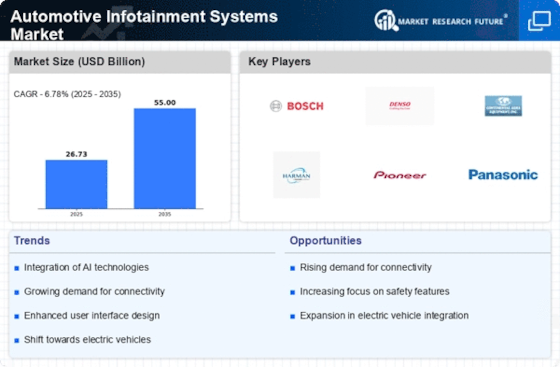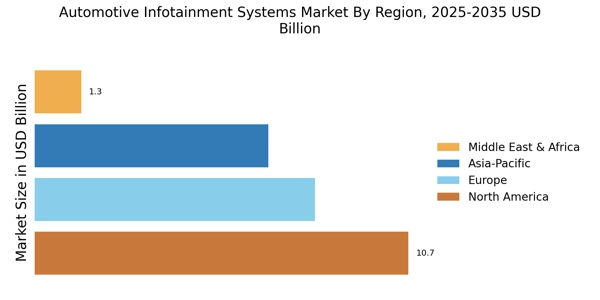Focus on User-Centric Design
User-centric design is emerging as a pivotal driver in the Automotive Infotainment Systems Market. Manufacturers are increasingly prioritizing intuitive interfaces and customizable features to enhance user experience. This focus on design is reflected in the growing trend of touchscreens and voice recognition systems, which allow for easier interaction while driving. Market data indicates that consumer preferences are shifting towards systems that offer personalized content and user-friendly navigation. As a result, companies are investing in research and development to create infotainment systems that cater to diverse user needs, thereby driving growth in the Automotive Infotainment Systems Market.
Adoption of Artificial Intelligence
The incorporation of artificial intelligence (AI) is significantly influencing the Automotive Infotainment Systems Market. AI technologies are being utilized to enhance voice recognition, predictive analytics, and personalized content delivery. This adoption not only improves the functionality of infotainment systems but also contributes to safer driving experiences by minimizing distractions. Market analysis suggests that the AI segment within automotive infotainment is expected to witness substantial growth, with projections indicating a potential increase in market share by over 15% in the next few years. This trend underscores the importance of AI in shaping the future of the Automotive Infotainment Systems Market.
Growth of Electric and Autonomous Vehicles
The growth of electric and autonomous vehicles is reshaping the Automotive Infotainment Systems Market. As the automotive landscape evolves, there is a heightened emphasis on integrating sophisticated infotainment systems that cater to the unique needs of electric and self-driving cars. These vehicles often require advanced navigation systems, real-time data analytics, and enhanced connectivity features to optimize performance and user experience. Market forecasts suggest that the rise of electric vehicles will lead to an increased demand for innovative infotainment solutions, with projections indicating a potential market expansion of over 30% in the next decade. This shift highlights the necessity for manufacturers to adapt their infotainment offerings to align with the future of mobility in the Automotive Infotainment Systems Market.
Rising Demand for Enhanced Safety Features
The rising demand for enhanced safety features is a critical driver in the Automotive Infotainment Systems Market. Consumers are increasingly prioritizing safety technologies that integrate with infotainment systems, such as collision avoidance and lane-keeping assistance. This trend is supported by regulatory bodies advocating for advanced safety measures in vehicles. Recent statistics indicate that vehicles equipped with advanced safety features are more likely to attract buyers, leading to a surge in demand for infotainment systems that incorporate these technologies. Consequently, manufacturers are focusing on developing infotainment solutions that not only entertain but also ensure driver and passenger safety, thereby propelling growth in the Automotive Infotainment Systems Market.
Integration of Advanced Connectivity Features
The Automotive Infotainment Systems Market is experiencing a notable shift towards advanced connectivity features. This trend is driven by the increasing consumer demand for seamless integration of smartphones and other devices into vehicles. Technologies such as Apple CarPlay and Android Auto are becoming standard, enhancing user experience and safety. According to recent data, the market for connected cars is projected to grow significantly, with estimates suggesting a compound annual growth rate of over 20% in the coming years. This integration not only improves entertainment options but also facilitates real-time navigation and communication, making it a crucial driver in the Automotive Infotainment Systems Market.

















